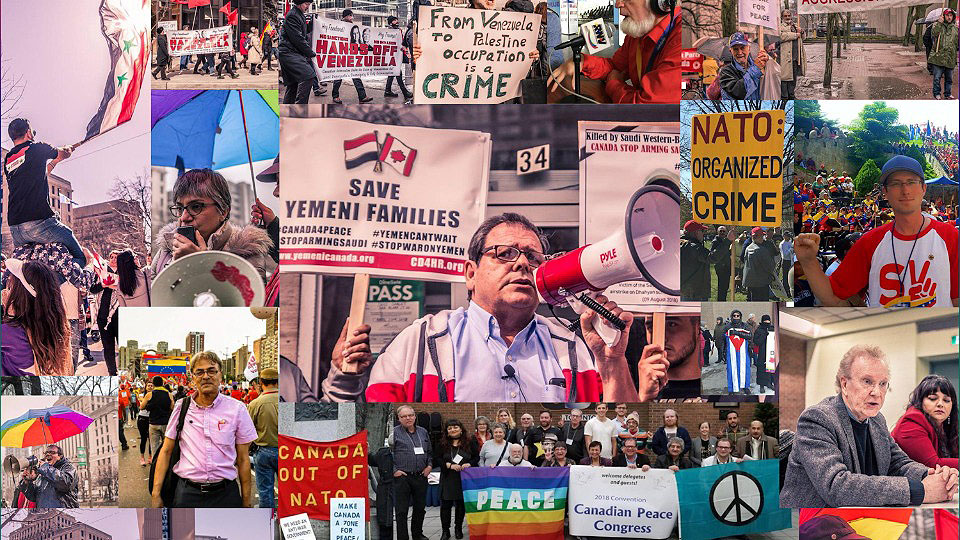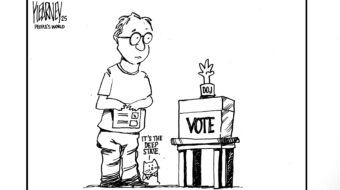
TORONTO—It is often not at the forefront of voters’ minds, but foreign policy is one of the most important issues in the current federal election underway in Canada. From ballooning military spending to the renewed Cold War against Russia and (especially) China to the proliferation of nuclear weapons to the ongoing and escalating imperialist aggressions aimed at “regime change,” foreign policy is a central concern.
While most political parties do backflips to avoid discussing peace and militarism (the Communist Party of Canada being a rare exception), there is a strengthening peace movement which is working to bring these issues into the election debate.
 One of the key organizations is the Canadian Peace Congress, which is convinced that Canada can make a difference in helping to end the scourge of militarism, aggression, and war around the world. In this federal election, the Congress is promoting its “Peace Alternative for Canada” as a way to fundamentally realign the country’s foreign and defense policies.
One of the key organizations is the Canadian Peace Congress, which is convinced that Canada can make a difference in helping to end the scourge of militarism, aggression, and war around the world. In this federal election, the Congress is promoting its “Peace Alternative for Canada” as a way to fundamentally realign the country’s foreign and defense policies.
Peace Congress executive member Ed Lehman notes that despite the beginnings of a resurgence in the country’s peace movement, the danger of world war is still present. “The Canadian government has refused to assist the global movement away from nuclear war and is planning to increase its investment in conventional and nuclear war preparations. It is in this context the Canadian Peace Congress has issued its Peace Alternative, a picture of what a peaceful foreign policy for Canada would look like.”
The defeat of Canada’s 2020 bid to win a seat on the UN Security Council helped to focus widespread attention on the country’s international policies and practices. The Peace Congress argues that “for far too long, Canada’s foreign policy has been rooted in its adherence to the western alliance led by the United States, and which serves the economic, political and strategic power interests of a select influential group of Canadian wealth and privilege at the expense of the social and economic needs of the people of Canada and the cause of peace.”
It is increasingly apparent to more and more people that there needs to be a fundamental change in direction. A recent poll by Nanos Research indicates that nuclear arms are a huge concern for people in Canada, with 80% saying that the government needs to do more to eliminate such weapons globally. The poll figures echo other research that indicates people in Canada are increasingly concerned about local and regional wars, bloated arms budgets, and renewed Cold War rhetoric and policies, as well as the growing—and related—threat of climate catastrophe.
Peace Congress President Miguel Figueroa says that a foreign policy of peace can free up massive public funds that can be dedicated to people’s needs like job creation, climate justice, improved pensions, and higher health and social spending. Figueroa stresses that winning—and maintaining—such a policy reorientation means making a break with the foreign policies of the U.S. and other imperialist forces like NATO. “At the end of the day, people need to realize that this country’s membership in military alliances like NATO and NORAD makes Canada a willing and dedicated participant in the US-led drive to war. This is a dangerous course which poses a growing threat to the very future of humanity, and it has to change now.”
The Peace Alternative for Canada outlines some of the essential policies and principles for “an independent Canadian foreign and defense policy based on peace and disarmament, not aggression and war; not one dictated by foreign governments, foreign or domestic armament corporations or transnational corporate interests.” Key components include:
Withdrawing from military alliances
The Peace Alternative notes that Canada “can never hope to have an independent foreign policy or put in place a “Peace Alternative” when it is tied, at the wrists and ankles, to military alliances such as NATO and NORAD that are in the forefront of promoting the expansion of nuclear and conventional armaments, engaging in aggressive wars and occupations, pressuring its member-states to increase military allocations, and actively working to undermine global disarmament measures.”
Central to achieving a foreign policy of peace is Canada’s immediate withdrawal from NATO, NORAD, and the “Five Eyes” intelligence alliance. The government must also cancel all agreements permitting foreign military forces in Canada’s territory and promote the dissolution of military alliances globally.
Nuclear disarmament
Canada must demand that current nuclear powers abide by Article VI of the Non-Proliferation Treaty (NPT), requiring them to reduce and eliminate their nuclear arsenals. The country needs to sign and ratify the UN Treaty on the Prohibition of Nuclear Weapons (TPNW), publicly oppose the actions of the United States to unilaterally cancel the Joint Comprehensive Plan of Action (JCPOA) and other existing disarmament agreements and treaties, and renounce and condemn the “nuclear first-strike” policy of the US and NATO. Canada needs to promote the closure of all foreign military bases around the world—including its own—and declare itself a “Nuclear Weapons-Free Zone.”
Cutting military spending
The April federal budget included a huge 28.5% increase in Canada’s defense spending over five years, from $25.3 billion CAD currently to over $32.5 billion CAD by 2026-27. Rather than increasing military spending, Canada must significantly reduce the arms budget, including canceling the procurement of new F-35 (or comparable) fighter jets, new frigates and other warships, battle tanks, and weaponized drones. The government must guarantee new civilian jobs for workers displaced by reduced defense spending.
Upholding international law
A foreign policy of peace recognizes the full equality of all states—including the right to independence, sovereignty, and territorial integrity—and upholds the principle of non-interference in the internal affairs of other countries. Canada must reject any participation in ‘regime change’ operations directed against the Bolivarian Republic of Venezuela, Nicaragua, Syria, Cuba, and other countries, and immediately remove illegal, unilateral, and punitive economic sanctions. It should also restore full diplomatic relations with Venezuela, Syria, Iran, and the DPRK, and speak out against the new Cold War directed primarily against China and Russia.
General disarmament
Canada must cancel the export permit for weapon sales to Saudi Arabia and the Defence Production Sharing Agreement with the U.S. Furthermore, the government should shut down the annual CANSEC arms trade show, prohibit the marketing and sale of Canadian-made military hardware and equipment, and end Canadian participation in the training of foreign military forces, which contribute to the repression of civilian populations in other countries.
Opposing the militarization of space
The Peace Alternative insists that, as an essential part of disarmament, Canada must resist the militarization of space. This includes opposing anti-ballistic missile systems and the use of satellites and near-space orbiting platforms for military and strategic purposes.
Supporting peace in the Middle East
Canada must insist that Israel comply with UN Resolutions demanding an end to its illegal occupation of all Palestinian, Syrian, and Lebanese lands seized in 1967, including removing its settlements on the West Bank. Canada needs to end its participation in the “proxy war” on Syria, end its punitive sanctions, and restore full diplomatic relations with Syria. Similarly, Canada must refuse to participate in or support the U.S.-led aggression against Iran, and must immediately end all economic and diplomatic sanctions on Iran.
Defending the environment
The Peace Congress calls for Canada to take action to achieve absolute reductions in carbon emissions, noting that this “must be achieved through sharp restrictions on reliance on fossil fuels.” Canada should support an International Treaty declaring the High Arctic as a military and resource extraction-free Zone and end the current practice of excluding carbon emissions from military operations in determining Canada’s overall emissions.










